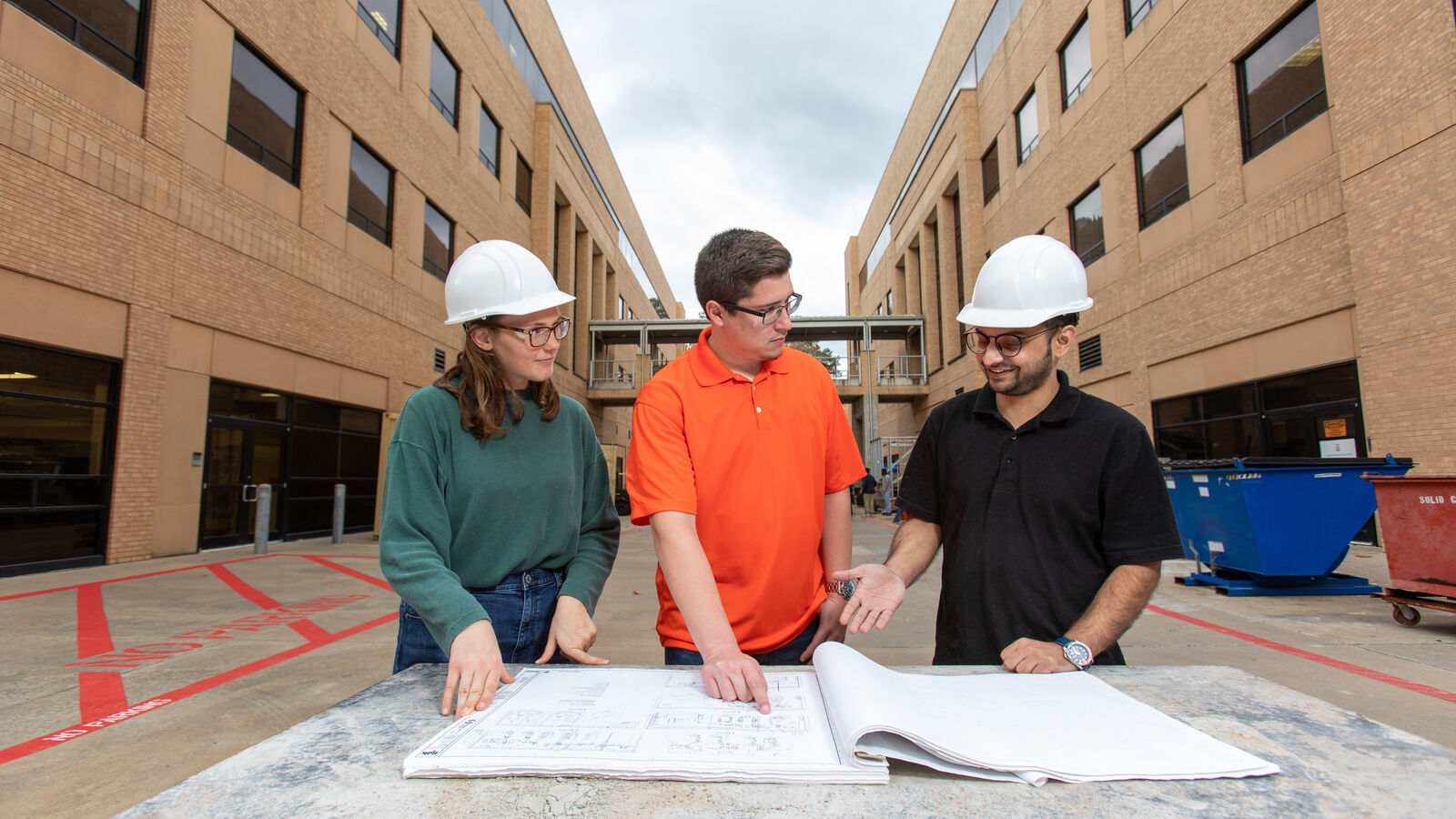
Master of Science in Civil Engineering
Advance Your Career as a Civil Engineer
Build your professional skills and competence to advance to the next level. With The University of Texas at Tyler’s Master of Science in civil engineering, you’ll be mentored by experienced industry professionals who coordinate research projects to improve infrastructure and reduce environmental impact right here in East Texas.
Three program tracks let you customize your education to fit your career goals, whether you want to deepen your knowledge in an engineering subdiscipline, work toward professional licensure or acquire management and leadership skills.
Why Earn a Master’s in Civil Engineering at UT Tyler?
You’re a builder and a visionary. You know that careful and precise planning leads to systems that work and structures that help improve our quality of life. You’re at a point in your career where you’re ready to build on your knowledge and experience to increase your expertise and move into positions of increasing responsibility.
As an engineer, you know it all starts with the right foundation. That’s why our Master of Science in civil engineering program prepares you as a professional to move forward with confidence.
Here’s what you’ll find at UT Tyler:
- Professors Who Are Experts in the Field: Learn from faculty who are practitioners and researchers with organizations including the Texas Department of Transportation, Federal Highway Administration, Southwest Institute of Forensic Science, Occupational Safety and Health Administration and Norwegian Geotechnical Institute.
- Real-World Impact: Work with faculty on research projects like designing an efficient bike network for the city of Tyler, use industrial and agricultural waste in sustainable pavements materials, or investigating the environmental benefits of recycling concrete. Get experience solving real problems in the real world.
- Mentored Growth: Get individualized attention and support to grow as a professional. Our low student-to-faculty ratio means you’ll develop relationships with faculty who act as guides and mentors during your studies and beyond.
- Outstanding Facilities: Get access to state-of-the-art workstations and laboratory facilities to power your learning.
- Career Fast-Track: Don’t hesitate in obtaining your master’s. For civil engineering undergraduate students at UT Tyler, our Bachelor’s to Master’s (4+1) BSCE/MSCE program lets you graduate with both degrees in just five years.
- Affordability: Build your professional skills without building a burden of debt. We offset our already low tuition with graduate assistantships, scholarships and other forms of financial support.
Curriculum
Based on the latest edition of the American Society of Civil Engineers’ text, “Civil Engineering Body of Knowledge for the 21st Century,” the curriculum for the MS in civil engineering is a 30-credit-hour course of study you can complete in two years. Subject areas and knowledge build off your undergraduate work and career experience to equip you for the next stage of professional growth.
You have three program tracks to choose from:
- Research: Acquire deep expertise in a particular area while honing your research skills. You’ll prepare and defend a thesis based on your original research, giving you preparation for further studies or advanced practice in the field.
- Professional Practice: Advance as an engineering professional and prepare to pass the Fundamentals of Engineering examination, a key initial step toward gaining licensure as a Professional Engineer (PE).
- Technical and Management Development: You’ve moved up to a point in your field — so, now, look toward a position of leadership. You’ll take courses in business management and enrich your knowledge of design to prepare to plan and oversee complex projects.
No matter which option you choose, you’ll learn to:
- Apply fundamental knowledge of specialized civil engineering concepts and modern engineering tools to solve engineering problems.
- Engage in independent learning and research to solve complex engineering problems.
- Embrace professional ethics, including the responsibility to consider the societal and environmental impacts of engineering and to pursue lifelong learning.
- Effectively communicate about engineering in an accessible way with different kinds of project stakeholders.
See All MSCE Degree Requirements Visit the Civil Engineering Degree Page
What Can You Do With an MS in Civil Engineering?
You’re ready to take the next step forward in your career. Maybe that means applying your advanced training in a specific area of civil engineering:
- Pavement Engineer: Help the modern world by designing, analyzing and overseeing the construction and maintenance of roads and pavement systems to ensure their durability, safety, and functionality.
- Structural Engineer: Ensure significant public and industrial buildings and other structures are designed for safety, efficiency and longevity.
- City Engineer: Empower healthy growth and help design urban areas that enhance human flourishing.
- Water Resources Engineer: Design the systems to provide an adequate and healthy water supply for an area’s inhabitants while minimizing environmental impacts.
Or make a move into leadership and increased responsibility as an engineering manager. You’ll help plan and direct larger projects and grow your skill set as a project manager.
Consider training tomorrow’s engineering professionals through a career in teaching. The research track of the MSCE program prepares you for doctoral studies and a position in higher education.
How to Apply
To be considered for admission, you will need:
- A completed online application.
- Official transcripts for all prior college- or graduate-level work, submitted to the Office of Graduate Admissions.
- Satisfactory grade point average on the student’s last four semesters of academic study and last 60 semester credit hours of upper division undergraduate or graduate courses.
- A bachelor’s degree in a Civil Engineering program accredited by the ABET Engineering Accreditation Commission. Students who have not earned such a degree will be required to complete prerequisite coursework before starting the MSCE program as determined by the MSCE Graduate Coordinator.
- A demonstrated proficiency in the use of the English language, both spoken and written.
Review All Application Requirements
See General Graduate School Admissions RequirementsThis path to the MSCE is available only to UT Tyler undergraduate students intending to complete a Master of Science in civil engineering contiguous with their BSCE degree. BSCE students must enter the MSCE program and complete the MSCE portion of the program without interruption.
Students interested in the 4+1 pathway must apply for consideration through the civil engineering program and admission to the graduate school. Students will be provisionally admitted to the 4+1 in the spring of their senior year and fully admitted once completing the BSCE and meeting all admission requirements for the MSCE program.
When you’re a working professional, fitting your coursework within your busy schedule can be a challenge. That’s why, in addition to our main campus in Tyler, we also offer the master’s in civil engineering program through our Houston Engineering Center for those who work in or near the city. At the HEC, you’ll learn from the same outstanding faculty and enjoy hands-on lab courses for experiential learning. Get the same great program closer to home.
February 28
Application deadline for summer admission for international students.
April 15
Application deadline for summer admission for domestic students.
April 30
Application deadline for fall admission for international students.
August 15
Application deadline for fall admission for domestic students.
October 1
The Free Application for Federal Student Aid opens for the upcoming academic year.
October 30
Application deadline for spring admission for international students.
December 20
Application deadline for spring admission for domestic students.
Explore Related Programs
Next Steps
Your future starts here. Advance in your profession with a master’s in civil engineering from UT Tyler.


